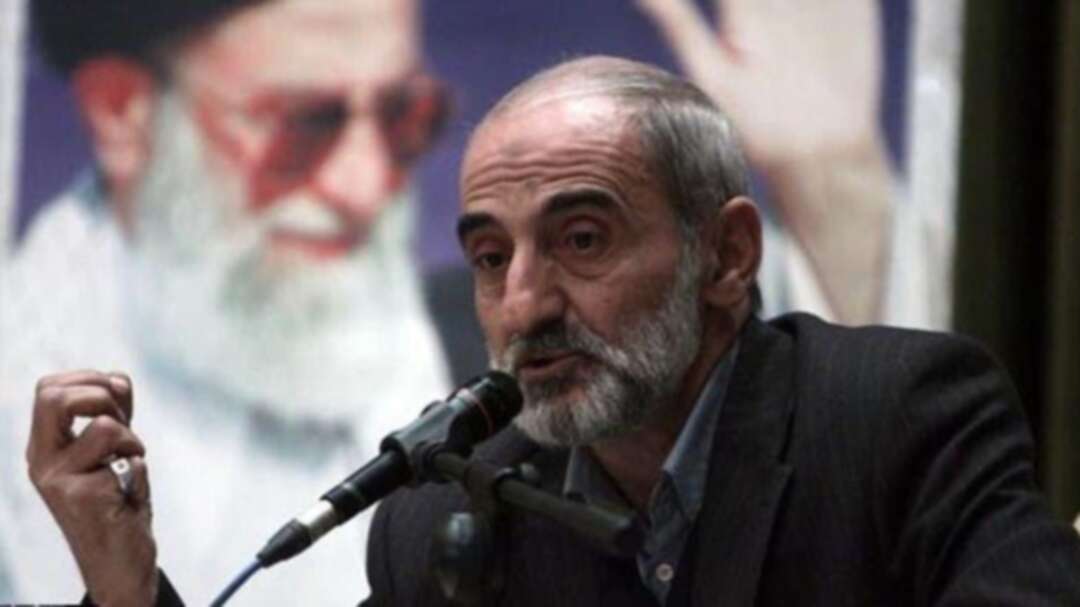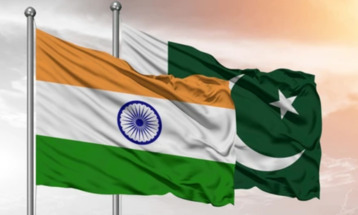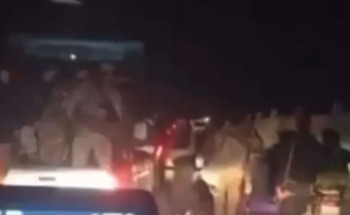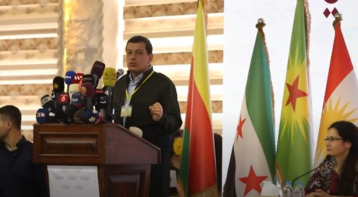-
Representative of Iran’s Khamenei calls on Iraqis to attack ‘spy den’ US embassy

Hossein Shariatmadari, one of Iranian Supreme Leader Ali Khamenei’s representatives, and the head of Iran’s hardline Kayhan newspaper, called on Iraqis to “occupy the US embassy like the Iranians did in 1979,” following major protests that gripped Baghdad in recent days.
In an editorial that featured in the newspaper on Saturday, Shariatmadari reiterated accusations by top Iranian officials claiming that the protests were instigated “by America and foreign elements.”
Occupying the US embassy in Tehran has had “many achievements” for Iran, he wrote, adding: “Why should Iraq’s revolutionary youth deprive their country of such achievements?”
Supporters of the founder of the Islamic Republic and former Supreme Leader Ayatollah Ruhollah Khomeini attacked and occupied the US embassy in Tehran in November of 1979, less than a year after the Islamic revolution in Iran.
US diplomats and embassy staff were held hostage for 444 days in an incident, which kick-started US sanctions against Iran.
On Friday, a senior Iranian cleric accused the US and Israel of inciting unrest in Iraq to disrupt Iranian pilgrims from participating in the Shia Arbaeen pilgrimage held in Iraq, according to the Tasnim news agency.
“The enemy is now determined against the Islamic nation, America and Zionism ... are targeting the Arbaeen and Iraq, and causing trouble because it is hard for them to accept the presence of millions
The protests in Iraq were sparked by chronic unemployment and poor public services, but many protesters voiced their discontent with Iran’s influence in Iraq.
Protestors have reportedly been chanting slogans against Iran for supporting Shia militias and groups who have a stranglehold on Iraq’s politics.
“Foreign elements’ presence is very clear in the latest unrest in Iraq,” Shariatmadari insisted, adding that “the citizens
Khamenei’s representative said the foreign elements “directed the protests against the alliance between the Iraqi and Iranian governments.”
“At the beginning, they
Many of the Popular Mobilization Units (PMU) militias are loyal to Iran, and the PMU’s deputy commander Jamal Jaafar al-Ibrahimi – known by his nom de guerre Abu Mahdi al-Mohandes – is a key Iranian ally. Mohandes is also the leader of Katai’b Hezbollah, the terrorist organization accused of attacking Saudi Arabian oil pipelines in May.
On Thursday, Iraq’s foreign ministry summoned Iran’s ambassador to Baghdad to denounce his statement threatening that Tehran would retaliate against an American attack anywhere in the world, including in Iraq.
The ministry statement said Iraqi official Abdul-Karim Hashem told Iran’s envoy, Iraj Masjedi, that American troops are in Iraq at the request of the Iraqi government.
Iraqi protesters have pressed on with angry anti-government rallies in the capital and across several provinces for a fifth day on Saturday, setting government offices on fire and ignoring appeals for calm from political and religious leaders.
The violent deadlock presented the conflict-scarred nation with its most serious challenge since the defeat of ISIS two years ago and deepened the political crisis of a country still struggling with the legacy of multiple, unfinished wars since the US invasion in 2003.
You May Also Like
Popular Posts
Caricature
BENEFIT Sponsors BuildHer...
- April 23, 2025
BENEFIT, the Kingdom’s innovator and leading company in Fintech and electronic financial transactions service, has sponsored the BuildHer CityHack 2025 Hackathon, a two-day event spearheaded by the College of Engineering and Technology at the Royal University for Women (RUW).
Aimed at secondary school students, the event brought together a distinguished group of academic professionals and technology experts to mentor and inspire young participants.
More than 100 high school students from across the Kingdom of Bahrain took part in the hackathon, which featured an intensive programme of training workshops and hands-on sessions. These activities were tailored to enhance participants’ critical thinking, collaborative problem-solving, and team-building capabilities, while also encouraging the development of practical and sustainable solutions to contemporary challenges using modern technological tools.
BENEFIT’s Chief Executive Mr. Abdulwahed AlJanahi, commented: “Our support for this educational hackathon reflects our long-term strategic vision to nurture the talents of emerging national youth and empower the next generation of accomplished female leaders in technology. By fostering creativity and innovation, we aim to contribute meaningfully to Bahrain’s comprehensive development goals and align with the aspirations outlined in the Kingdom’s Vision 2030—an ambition in which BENEFIT plays a central role.”
Professor Riyadh Yousif Hamzah, President of the Royal University for Women, commented: “This initiative reflects our commitment to advancing women in STEM fields. We're cultivating a generation of creative, solution-driven female leaders who will drive national development. Our partnership with BENEFIT exemplifies the powerful synergy between academia and private sector in supporting educational innovation.”
Hanan Abdulla Hasan, Senior Manager, PR & Communication at BENEFIT, said: “We are honoured to collaborate with RUW in supporting this remarkable technology-focused event. It highlights our commitment to social responsibility, and our ongoing efforts to enhance the digital and innovation capabilities of young Bahraini women and foster their ability to harness technological tools in the service of a smarter, more sustainable future.”
For his part, Dr. Humam ElAgha, Acting Dean of the College of Engineering and Technology at the University, said: “BuildHer CityHack 2025 embodies our hands-on approach to education. By tackling real-world problems through creative thinking and sustainable solutions, we're preparing women to thrive in the knowledge economy – a cornerstone of the University's vision.”
opinion
Report
ads
Newsletter
Subscribe to our mailing list to get the new updates!






















